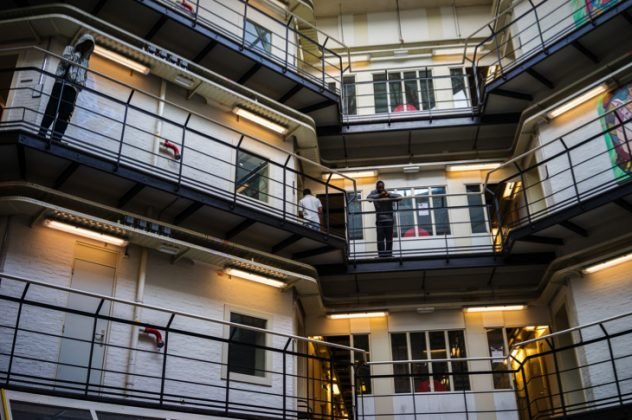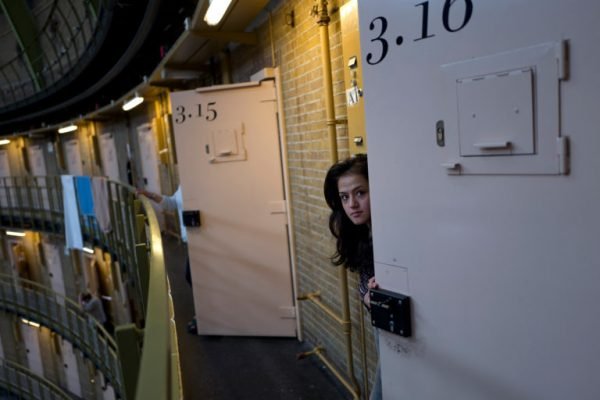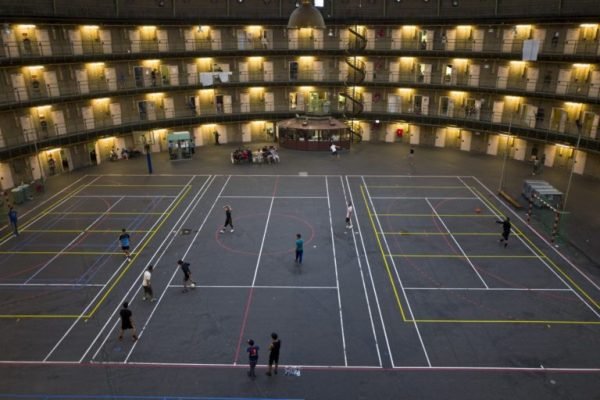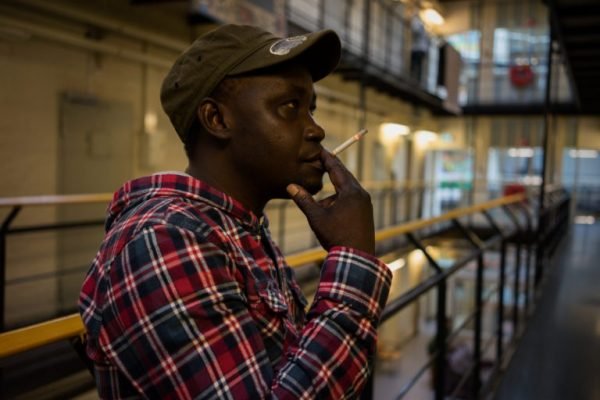
(True Activist) It might be hard to imagine a world where prisons actually close because of a reduction in prisoners if you live in the U.S., but in many countries abroad this is not such a rare occasion. In the United States, the existence of private prisons that churn out a profit means that the prison-industrial complex focuses less on helping inmates stay out of trouble and more on how the inmates can benefit prison owners.
In the Netherlands, however, crime has been rapidly decreasing for the last decade and 19 of the nearly 60 prisons have since closed. Some prisons even took in inmates from Belgium and Norway just to keep up their locations. While this may have resulted in a loss of jobs, it means that less people are being incarcerated, which is always a positive in any country. On top of fewer prisoners and less crime, the government in the Netherlands found a way to repurpose the closed prisons: they now house refugees in there.

Ever since the Syrian Civil War began in 2011, millions of Syrian citizens have been displaced from their homes and forced to seek refuge in nearby countries. One of those countries is the Netherlands, which has brought in tens of thousands of refugees over the years. With so little space, however, the nation struggled to find locations to place the incoming people. The agency responsible for housing asylum seekers re-opened 12 prisons in order to provide temporary housing while the refugees wait for their paperwork to be processed.
While the refugees aren’t allowed to work in the country, they are encouraged to learn Dutch and build connections with locals in order to become integrated in the community while they wait as long as six months for their asylum to be granted.

“Their safety is our main priority along with their health and daily needs,” one of the prison directors, Menno Schot, said of the migrants. “The country is new for them so we are their guide in Holland.”
The cells are tight but can reportedly house a family of three or four using bunk beds. Single female refugees are invited to stay in the all-female section of the prison if they choose to. The refugees can come and go as they please, and this living situation is actually very ideal compared to the horrible camps lining other nations that can no longer find space for displaced people. According to AP, the refugees don’t mind the heavy prison doors and likened it to better security, not more oppression. They also said they like the living conditions but mentioned that the food could be better.

Many refugees have developed a sense of normalcy in their temporary home, even practicing some of their work skills in order to stay sharp. People are able to spend their time however they please, as long as it’s legal and doesn’t hurt anyone. They can do chores, such as their own laundry, which allows them to keep up with cleaning routines that they would normally experience in a home.
“If a country has no prisoners to put in jail,” one refugee said, “it means this is the safest country that I want to be living in.”
This article has been published under creative commons 3.0 licence and with attribution to http://www.trueactivist.com/with-less-crime-closed-dutch-prisons-are-instead-being-used-to-house-refugees/
Do you like our independent news, reports and content and want to support unbiased, global journalism? Then please follow us! Thank you.
That's great to hear. Thanks for your great work publishing these stories, otherwise I would never know about them. And this particular news item is like a win-win :)
Downvoting a post can decrease pending rewards and make it less visible. Common reasons:
Submit
Decrease the crime rate = 4 birds with 1 stone.
Great post bud. Showing some light for humanity.
Downvoting a post can decrease pending rewards and make it less visible. Common reasons:
Submit
Hi! I am a robot. I just upvoted you! I found similar content that readers might be interested in:
http://anonymous-news.com/less-crime-closed-dutch-prisons-instead-used-house-refugees/
Downvoting a post can decrease pending rewards and make it less visible. Common reasons:
Submit
REESTEEMED. This is a news update worth sharing. Am actually amazed. How did they manage to decrease their crime rate that much?
Downvoting a post can decrease pending rewards and make it less visible. Common reasons:
Submit
yea! I'm glad to see good news being shared, its easier to find the bad
Downvoting a post can decrease pending rewards and make it less visible. Common reasons:
Submit
yeah you are right on that
Downvoting a post can decrease pending rewards and make it less visible. Common reasons:
Submit
Does ur country have a
CENTRAL BANK? ... Then there is a MASSIVE PROBLEM that u are not even aware of! In 2007/ 08, the ENTIRE GLOBE was just a few hours froma global financial meltdown! Who controls the politicians/ political system? That would be the bankers/ banksters! Have u NEVER wondered why u work HARDER/ LONGER/ SACRIFICE MORE, for less of apersonalresult???Downvoting a post can decrease pending rewards and make it less visible. Common reasons:
Submit
Relax @damianne-bakero. Haha. Btw it's more like 2008-2009 than 2007-2008.
Decemeber of 2007 was when everything crumbled then it went on until late 2009 or early 2010.
I wonder why the reaction with a post like this. Do you happen to know why 2008-2009 happened?
Downvoting a post can decrease pending rewards and make it less visible. Common reasons:
Submit
Its amazing that even their PRISONS have more space in them than american ones do
its also astonishing that this is even possible...can you imagine having so few criminals that you can do this? absolutely incredible
Downvoting a post can decrease pending rewards and make it less visible. Common reasons:
Submit
this is so great, i'm glad to see some positive stuff happening, seems like those north eastern European countries are really getting things together
Downvoting a post can decrease pending rewards and make it less visible. Common reasons:
Submit
It's great to hear that the crime rate has been decreasing in the Netherlands.
I'm glad to see these old prisons being put to good use
Downvoting a post can decrease pending rewards and make it less visible. Common reasons:
Submit
I am from the Netherlands and this article is complete nonsense (I've seen many of them on the web unfortunately). Crime rates are rising in the Netherlands, but crime isnt reported anymore to the police, because the police don't have any means to solve the crimes. This is due to really hard budget cuts.
Downvoting a post can decrease pending rewards and make it less visible. Common reasons:
Submit
Interesting! I will note other benefits of less prisoners, that are directly proportional to jobs lost as a result of lower incarceration rates.
The labor of those previously needed to perform the distasteful and hazardous (particularly morally hazardous) job of keeping people in cages is available to provide goods and services and increase the standard of living of the country.
Also, while the incomes provided by those previously available jobs no longer is spent into the economy, the taxes providing that income, necessarily greater than the incomes they supported, are no longer extracted from the economy. Whenever taxpayer supported jobs are lost, there is a net increase in the standard of living in the country, as the taxes formerly extracted from citizens are instead spent by them on goods and services, saved, or gifted.
All of these benefits are in an ideal system. In an actual system in which corruption inevitably further exacerbates losses (and no industry more than prisons better illustrates this) due to government spending, when that supply of graft money is reduced, there are therefore more benefits the country, and it's citizens, when such spending is reduced.
Additionally, the psychological harm that is done to people when they are kept in cages is not minor, nor of little economic or moral consequence. In every species that has been studied, confinement in similar conditions dramatically increases health degradation, and thereby medical costs, as well as pain and suffering. No zoos treat other animals so poorly any longer, as it is both inhumane and economically less viable.
Were you to keep any other animal species in such conditions, you would rightly be charged with criminal mistreatment.
Often such psychological damage isn't limited to the people confined, but is passed on to their families, loved ones, and communities in various ways, notably as increased crime, creating a self perpetuating cycle of net economic losses, moral, and physical harm.
We can only hope that this better future soon is one America can hope to join, and that the most heavily incarcerated and enslaved country in the history of the world (all American prisoners are forced to work for wages as low as $1/day) might one day be again worthy of the name ''Land of the Free, Home of the Brave", instead of "Land of the Fee, Home of the Slave" it has earned today.
Downvoting a post can decrease pending rewards and make it less visible. Common reasons:
Submit
Interesting! I will note other benefits of less prisoners, that are directly proportional to jobs lost as a result of lower incarceration rates.
The labor of those previously needed to perform the distasteful and hazardous (particularly morally hazardous) job of keeping people in cages is available to provide goods and services and increase the standard of living of the country.
Also, while the incomes provided by those previously available jobs no longer is spent into the economy, the taxes providing that income, necessarily greater than the incomes they supported, are no longer extracted from the economy. Whenever taxpayer supported jobs are lost, there is a net increase in the standard of living in the country, as the taxes formerly extracted from citizens are instead spent by them on goods and services, saved, or gifted.
All of these benefits are in an ideal system. In an actual system in which corruption inevitably further exacerbates losses (and no industry more than prisons better illustrates this) due to government spending, when that supply of graft money is reduced, there are therefore more benefits the country, and it's citizens, when such spending is reduced.
Additionally, the psychological harm that is done to people when they are kept in cages is not minor, nor of little economic or moral consequence. In every species that has been studied, confinement in similar conditions dramatically increases health degradation, and thereby medical costs, as well as pain and suffering. No zoos treat other animals so poorly any longer, as it is both inhumane and economically less viable.
Were you to keep any other animal species in such conditions, you would rightly be charged with criminal mistreatment.
Often such psychological damage isn't limited to the people confined, but is passed on to their families, loved ones, and communities in various ways, notably as increased crime, creating a self perpetuating cycle of net economic losses, moral, and physical harm.
We can only hope that this better future soon is one America can hope to join, and that the most heavily incarcerated and enslaved country in the history of the world (all American prisoners are forced to work for wages as low as $1/day) might one day be again worthy of the name ''Land of the Free, Home of the Brave", instead of "Land of the Fee, Home of the Slave" it has earned today.
Downvoting a post can decrease pending rewards and make it less visible. Common reasons:
Submit
1 out of every 100 Americans is sitting in prison.
Downvoting a post can decrease pending rewards and make it less visible. Common reasons:
Submit